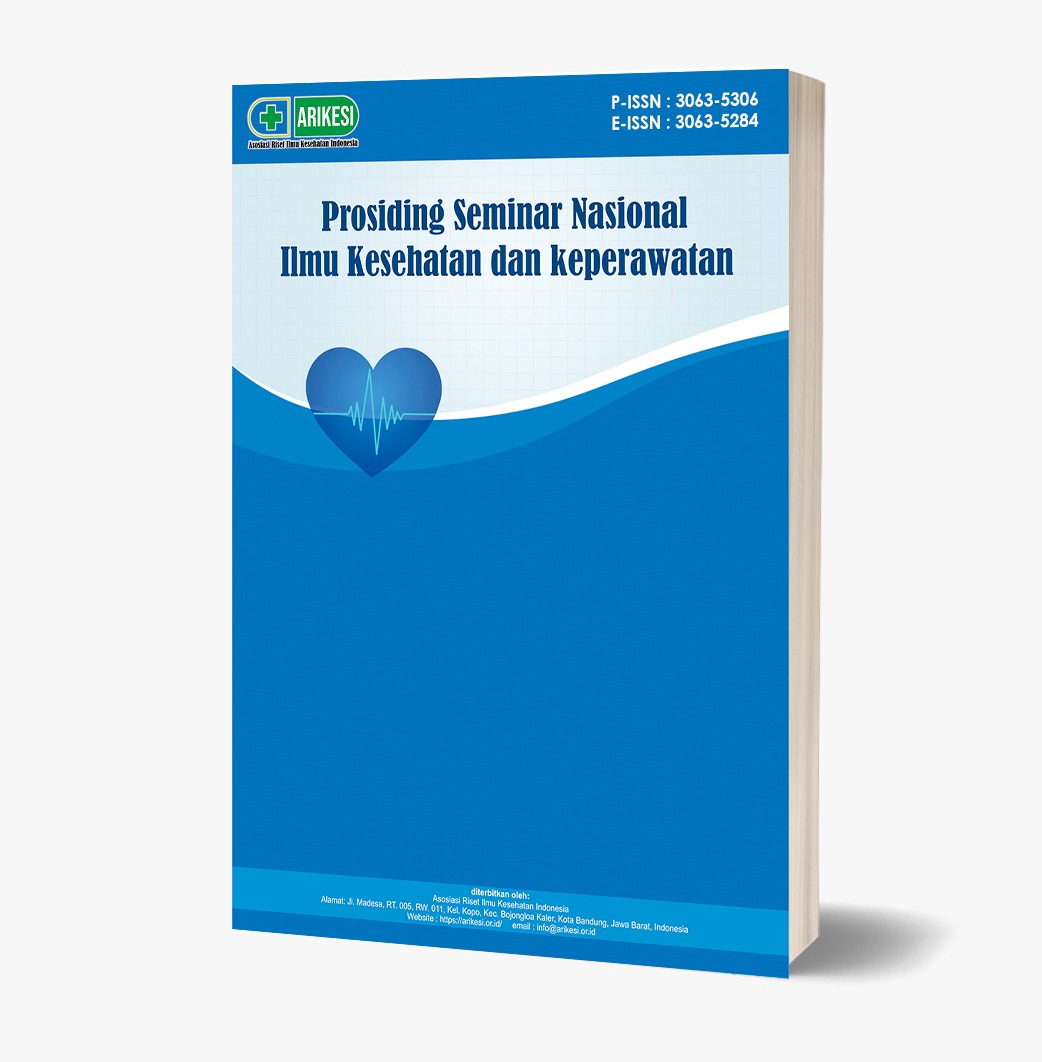Simulasi Dinamika Molekul Protein Apo FKBP12
DOI:
https://doi.org/10.61132/prosemnasikk.v1i1.20Keywords:
apo protein, FKBP12, molecular dynamics simulationsAbstract
The 12 kDa FK506 binding protein, FKBP12, is a receptor with a molecular mass of 12 kDa for the immunosuppressant FK506 (Tacrolimus), binds strongly to the transforming growth factor β (TGF-β) type I receptor involved in the regulation of cell proliferation and differentiation needed in wound healing. This study aimed to understand the stability of FKBP12 in apo form using molecular dynamic simulations combined with potential flooding to observe the structural changes in a short time of simulations. Three similar starting structures resulted three different structures at the end of simulations, including at their binding cavity. This outcome showed that even the flexibility of the protein was quite stable, but the structure of the binding cavity are significantly affected.
Downloads
References
Altis, A., Nguyen, P. H., Hegger, R., & Stock, G. (2007). Dihedral angle principal component analysis of molecular dynamics simulations. The Journal of Chemical Physics, 126(24), 244111. https://doi.org/10.1063/1.2746330
Annett, S., Moore, G., & Robson, T. (2020). FK506 binding proteins and inflammation related signalling pathways; basic biology, current status and future prospects for pharmacological intervention. Pharmacology & Therapeutics, 215, 107623.
Bussi, G., Donadio, D., & Parrinello, M. (2007). Canonical sampling through velocity rescaling. Journal of Chemical Physics, 126(1). https://doi.org/10.1063/1.2408420
da Silva, A. S., & Vranken, W. (2012). ACPYPE - AnteChamber PYthon Parser interfacE. BMC Research Notes, 5, 367.
Darden, T., & Pedersen, L. (1993). Particle mesh Ewald: An N.log(N) method for Ewald sums in large systems. Journal of Chemical Physics, 98, 10089–10092.
Hess, B., Kutzner, C., van der Spoel, D., & Lindahl, E. (2008). GROMACS 4: Algorithms for highly efficient, load-balanced, and scalable molecular simulation. Journal of Chemical Theory and Computation, 4(3), 435–447. https://doi.org/10.1021/ct700301q
Jolliffe, I. T. (2002). Principal component analysis: A beginner’s guide — I. Introduction and application. Springer. https://doi.org/10.1002/j.1477-8696.1990.tb05558.x
Jorgensen, W. L., Chandrasekhar, J., Madura, J. D., Impey, R. W., & Klein, M. L. (1983). Comparison of simple potential functions for simulating liquid water. Journal of Chemical Physics, 79, 926–935.
Lange, O. F., Schäfer, L. V., & Grubmüller, H. (2006). Flooding in GROMACS: Accelerated barrier crossings in molecular dynamics. Journal of Computational Chemistry, 27, 1693–1702. https://pubmed.ncbi.nlm.nih.gov/16900489/
Lemkul, J. (2019). From proteins to perturbed Hamiltonians: A suite of tutorials for the GROMACS-2018 molecular simulation package [Article v1.0]. Living Journal of Computational Molecular Science, 1(1), 1–53. https://doi.org/10.33011/livecoms.1.1.5068
Lindorff-Larsen, K., Piana, S., Palmo, K., Maragakis, P., Klepeis, J. L., Dror, R. O., & Shaw, D. E. (2010). Improved side-chain torsion potentials for the Amber ff99SB protein force field. Proteins: Structure, Function and Bioinformatics, 78(8), 1950–1958. https://doi.org/10.1002/prot.22711
Michnick, S. W., Rosen, M. K., Wandless, T. J., Karplus, M., & Schreiber, S. L. (1991). Solution structure of FKBP, a rotamase enzyme and receptor for FK506 and rapamycin. Science, 252(5007), 836–839.
Mu, Y., Nguyen, P. H., & Stock, G. (2005). Energy landscape of a small peptide revealed by dihedral angle principal component analysis. Proteins: Structure, Function, and Genetics, 58(1), 45–52. https://doi.org/10.1002/prot.20310
Parrinello, M., & Rahman, A. (1981). Polymorphic transitions in single crystals: A new molecular dynamics method. Journal of Applied Physics, 52(12), 7182–7190. https://doi.org/10.1063/1.328693
Pronk, S., Páll, S., Schulz, R., Larsson, P., Bjelkmar, P., Apostolov, R., Shirts, M. R., Smith, J. C., Kasson, P. M., van der Spoel, D., Hess, B., & Lindahl, E. (2013). GROMACS 4.5: A high-throughput and highly parallel open source molecular simulation toolkit. Bioinformatics, 29(7), 845–854. https://doi.org/10.1093/bioinformatics/btt055
Quist-Løkken, I., Andersson-Rusch, C., Kastnes, M. H., Kolos, J. M., Jatzlau, J., Hella, H., Olsen, O. E., Sundan, A., Knaus, P., Hausch, F., & Holien, T. (2023). FKBP12 is a major regulator of ALK2 activity in multiple myeloma cells. Cell Communication and Signaling, 21(1), 1–16.
Rivera, A., & Heitman, J. (2023). Natural product ligands of FKBP12: Immunosuppressive antifungal agents FK506, rapamycin, and beyond. PLoS Pathogens, 19(1), 1–7.
Szep, S., Park, S., Boder, E. T., van Duyne, G. D., & Saven, J. G. (2009). Structural coupling between FKBP12 and buried water. Proteins, 74(3), 603–611.
van der Spoel, D., Lindahl, E., Hess, B., Groenhof, G., Mark, A. E., & Berendsen, H. J. C. (2005). GROMACS: Fast, flexible, and free. Journal of Computational Chemistry, 26, 1701–1718. https://doi.org/10.1002/jcc.20291
Widjajakusuma, E. C., Frederica, M., & Kaweono, K. (2023). Combined classical and flooding molecular dynamics simulations of the Mip-rapamycin and FKBP12-rapamycin complexes. Jurnal Kimia Sains Dan Aplikasi, 26(8), 300–309. https://doi.org/10.14710/jksa.26.8.300-309
Widjajakusuma, E. C., Frederica, M., Kaweono, K., Shea, A., Jawa, G. D. S. L., Kelan, Y. A., Indah, A., An’nisavia, F., … Setiyoningsih, D. V. (2022). Studi perbandingan sifat struktur dan dinamika bentuk apo dan holo dari FKBP12 dan Mip dengan menggunakan simulasi dinamika molekul. Jurnal Farmasi Sains Dan Terapan, 9(1), 24–29. https://doi.org/10.33508/jfst.v9i1.4059
Wieder, M., Perricone, U., Seidel, T., & Langer, T. (2016). Pharmacophore models derived from molecular dynamics simulations of protein-ligand complexes: A case study. Natural Product Communications, 11(10), 1934578X1601101019.
Xu, X., Su, B., Barndt, R. J., Chen, H., Xin, H., Yan, G., Chen, L., Cheng, D., Heitman, J., Zhuang, Y., Fleischer, S., & Shou, W. (2002). FKBP12 is the only FK506 binding protein mediating T-cell inhibition by the immunosuppressant FK506. Transplantation, 73(11).







